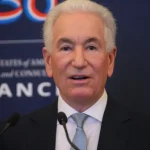

A Democrat who recently won their primary in Oregon’s 5th Congressional District, a swing district, previously supported a passed ballot measure that decriminalized drugs in the area.
Oregon state Rep. Janelle Bynum voiced her support for Measure 110, which, after being passed in November 2020, decriminalized most possession of controlled substances.
That ballot measure passed 58.5% to 41.5% in the state, with Portland’s Multnomah County offering the most votes in favor at a nearly 3-to-1 margin. However, Bynum’s previous support for the measure won’t likely appeal so much to voters anymore; a February poll saw 61% of voters call the policy a failure.
Twenty-seven percent of those in the poll said the policy needed more time to work.
Bynum noted in her Facebook post that despite telling voters to say yes to the measure, “I think we can get better legislation through the legislature. This was a very hard toss-up.”
“It tells us a couple of things. No. 1, Oregonians are compassionate people,” Bynum said in response to a question about Measure 110 in a November 2023 interview.
“Number two, it also tells the legislature that the people were hungry for a certain approach. And it’s not the legislature’s job to question the people; it’s the legislature’s job to implement the will of the people. … And I believe that Oregonians have said, ‘Hey, we want a compassionate response to drug treatment and addiction. But we also want to make sure, as small business owners, as parents, that our streets are safe and that our loved ones are cared for and our children are not harmed by people in crisis.’”
Republicans, including Bynum’s competition in incumbent Rep. Lori Chavez-Deremer (R-OR), haven’t been fans of the measure.
“Congresswoman Chavez-DeRemer has led the charge against Measure 110 at the federal level,” campaign spokesman Aaron Britt told the Washington Examiner.
“Recognizing the devastating impact decriminalizing hard drugs like fentanyl has had on communities across the state, she’s worked across the aisle to enact proposals to hold drug traffickers accountable and declare a national fentanyl emergency — opening up federal resources to address this crisis,” Britt added. “She will continue advocating for commonsense, tough-on-crime policies to support law enforcement and improve public safety.”
Chavez-DeRemer also expressed her concerns about the measure in an August 2023 letter to Gov. Tina Kotek (D-OR).
“Three years ago, our constituents voted for a measure they were told would reduce drug abuse,” she wrote. “Instead, drug abuse has exploded and our neighbors fighting addiction have been left to fend for themselves. … The message from Oregonians is clear: Time is up.”
Kotek recently signed HB 4002, which recriminalized hard drugs and rolled back some parts of measure 110. New criminal charges won’t be effective until Sept. 1 though.
Measure 110’s issues are considered bipartisan in the state’s legislative chambers, but Republicans and Democrats haven’t found a compromise on acceptable punishments for drug offenders. Neither side can agree on the severity of punishment for offenders.
Unintentional opioid deaths have increased every year in Oregon since 2019, with fentanyl a main driver of deaths across the United States due to its lethality.
CLICK HERE TO READ MORE FROM THE WASHINGTON EXAMINER
The Cook Political Report rated the OR-05 race as a “Republican Toss-Up,” as the district was held by Democrats for years until Chavez-DeRemer took office in 2023.
The Washington Examiner contacted Bynum’s campaign but did not receive a response.





